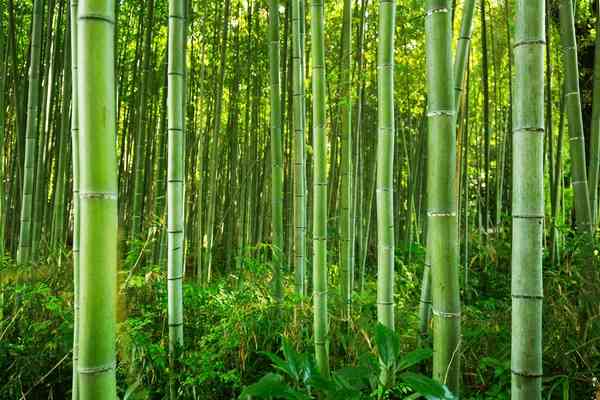Bamboo’s Spiritual Meaning: Understanding Its Symbolic Importance
Introduction
Bamboo is not just any ordinary plant. It holds a deep spiritual and cultural significance, symbolizing qualities that we admire in human character.
Its strength, flexibility, and rapid growth reflect the unique characteristics that make it so special.
Exploring the spiritual meaning of bamboo reveals its profound impact on spirituality and philosophy. Join me on this journey as we delve into the diverse and fascinating world of bamboo.
The Symbolic Importance of Bamboo
Bamboo has been revered in many cultures for centuries, representing various virtues and qualities. In Buddhism, bamboo is seen as a symbol of peace, enlightenment, and simplicity. Its hollow interior represents the openness necessary to receive new knowledge and wisdom.
In Chinese culture, bamboo is associated with strength and resilience. Its ability to bend without breaking during strong winds is seen as a quality to be admired and emulated.
This belief has also led to bamboo being used in martial arts and as a symbol of longevity.
In Native American cultures, bamboo represents protection and purification. It is believed that burning bamboo brings positive energy into the environment while removing negative energy.

The Spiritual Journey of Bamboo
Bamboo’s spiritual journey begins with its humble beginnings as a small sprout emerging from the ground.
This symbolizes new beginnings, growth, and resilience. As it grows taller and stronger, it represents progress, development, and overcoming obstacles.
The flexible nature of bamboo is often associated with adaptability and the ability to thrive in any environment. Its strength lies in its ability to bend without breaking, reminding us to remain flexible and open to change in our own lives.
The rapid growth rate of bamboo is also a significant aspect of its spiritual journey. It teaches us the importance of patience and perseverance, as it takes several years for bamboo to reach its full potential.
The Philosophical Significance of Bamboo
Bamboo’s simple yet versatile nature has inspired many philosophical teachings. Its hollow interior is a reminder to empty our minds and remain open to new knowledge and wisdom. It also symbolizes simplicity, reminding us to strip away unnecessary complexities in our lives.
The strength and resilience of bamboo remind us to withstand challenges with grace and determination. Its straight form represents living with integrity and standing firm in our beliefs.
In Zen Buddhism, the sound of the bamboo flute is said to represent the sound of one hand clapping, symbolizing the concept of emptiness and the interconnectedness of all things.
Bamboo in Chinese Culture
In Chinese culture, bamboo holds profound symbolism, representing not only resilience, strength, and flexibility, but also the ability to bend without breaking in the face of adversity.
These inherent qualities have deeply influenced various aspects of society, ranging from art and literature to daily rituals.
The concept of lucky bamboo, revered in Feng Shui practices, further reinforces this symbolism, serving as a foundational element that brings good fortune and positive energy into people’s lives.
The enduring significance of bamboo in Chinese culture is a testament to its rich spiritual significance and enduring presence in the collective consciousness.
The Significance of Lucky Bamboo
Lucky bamboo is more than an ornamental plant; it’s a symbol of good fortune and prosperity. Each number of stalks carries a specific meaning:
- One Stalk: Represents truth and commitment, embodying simplicity and honesty.
- Two Stalks: Symbolize love and are often gifted to couples, reflecting the belief that good things come in pairs.
- Three Stalks: Stand for happiness and new beginnings, making them a popular gift for celebrations.
- Five Stalks: Correspond to the five elements (wood, fire, earth, metal, and water), promoting balance and harmony.
Bamboo in Japanese Culture
In Japanese culture, bamboo holds great significance as a symbol of purity, innocence, and resilience.
Its presence in meticulously designed Zen gardens beautifully embodies the essence of simplicity and natural beauty, which are highly cherished in Japanese aesthetics.
The straight, unbranched stem of bamboo is not only admired for its elegant form but is also seen as a metaphorical path towards enlightenment, representing integrity, uprightness, and the pursuit of spiritual growth.
The intricate and delicate patterns found on the leaves of bamboo add an extra layer of intricacy and allure, further enhancing its allure in Japanese art and design.
Bamboo in Hinduism
In Hindu culture, bamboo holds a sacred and revered place due to its rich symbolism. It is considered a representation of purity, resilience, and longevity, embodying the essence of nature’s enduring strength.
Throughout history, bamboo has been an integral part of various religious rituals, believed to possess the power to ward off evil and negative energies.
Moreover, the gentle tinkling sound of bamboo chimes, as they sway in the breeze, is believed to have a transformative effect on the surroundings.
It is said to purify the environment, creating an atmosphere of harmony, peace, and tranquility, inviting a sense of serenity into the space it inhabits.
The profound significance and peaceful aura associated with bamboo make it a revered and cherished element in Hindu culture, weaving its way into the fabric of rituals and daily life, fostering a deeper connection with nature and spirituality.

Bamboo in Other Spiritual Practices
Beyond these major cultures, bamboo’s spiritual meaning extends into various practices:
- Witchcraft: Associated with abundance, protection, and wishes.
- Local Practices: In many indigenous cultures, bamboo is used in rituals and as a symbol of community and strength.
- Feng Shui: In this ancient Chinese practice of harmonizing energy, bamboo is considered a lucky plant that brings growth and prosperity.
- Buddhism: Bamboo is revered for its strength, flexibility, and humility in Buddhist teachings, symbolizing the path towards enlightenment. It also represents simplicity and emptiness of desire.
Artistic Representations and Modern Interpretations
Artistic bamboo arrangements, such as intricately braided or towering forms, are not merely decorative objects.
Beyond their aesthetic appeal, they hold profound meanings deeply rooted in cultural symbolism, often associated with the promise of future prosperity and exponential growth.
Throughout history and in modern spirituality, bamboo has remained a powerful symbol of adaptability, resilience, and sustainable growth, embodying the harmony between nature and human existence.
Conclusion
Bamboo’s spiritual meaning is as diverse as it is profound. Across cultures, it symbolizes strength, purity, and growth, reflecting the human journey toward enlightenment and harmony. Its presence in our lives is a reminder of these enduring values.







